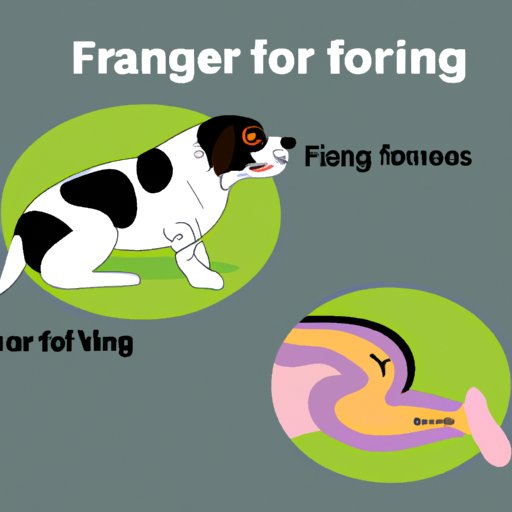Introduction
Excessive flatulence in dogs can be a source of discomfort, embarrassment, and even a potential sign of an underlying health issue. Every pet owner has experienced the unpleasant odors and sounds of their furry friend passing gas, but what causes this problem? In this article, we will explore the common reasons why dogs fart excessively and the best remedies to address the issue.
Causes of Excessive Flatulence in Dogs
Many factors can contribute to excessive flatulence in dogs, including dietary habits, allergies, digestive issues, underlying health conditions, and behavior.
Diet
A dog’s diet can have a significant impact on its digestive system, especially if it contains a high amount of fiber or difficult-to-digest foods such as beans or dairy. Some dogs may also have food sensitivities or allergies that cause gas and bloating. Switching to a high-quality, easily digestible dog food can help reduce excessive farting.
Allergies
Dogs can suffer from allergies, just like humans. Common allergens include certain proteins contained in food, airborne substances like pollen or mold, or flea bites. Allergy symptoms often include gastrointestinal problems, such as diarrhea or flatulence. If you suspect your dog has an allergy, consult with your vet to identify the specific trigger and develop a treatment plan.
Digestive Issues
Digestive problems such as constipation, inflammatory bowel disease (IBD), or bacterial infections can cause flatulence in dogs. In these cases, your dog may also experience abdominal pain, vomiting, or diarrhea. Your vet can diagnose any underlying digestive issues and prescribe the appropriate treatment.
Underlying Health Conditions
Sometimes, excessive flatulence can be a sign of more severe underlying health issues such as cancer, liver disease, or pancreatitis. While this is less common, if you notice other symptoms alongside excessive gas like lethargy, loss of appetite, or weight loss, consult with your veterinarian immediately to rule out any serious underlying conditions.
Behavior
Some dogs may have flatulence due to certain habits or behaviors. Eating too quickly can cause your dog to swallow air and lead to gas. Certain breeds such as Bulldogs or Pugs have a predisposition to fart more frequently due to their shorter and flatter snouts that affect their ability to eat and breathe properly.
Remedies to Reduce Flatulence
There are several ways to reduce excessive flatulence in dogs, including dietary changes, grooming, supplements, or medication.
Dietary Changes
Switching to a high-quality, easily digestible dog food can help reduce excessive farting. Avoid feeding your dog table scraps and high-fat or high-fiber foods that are hard to digest. You can also try feeding smaller, more frequent meals rather than one or two larger ones. Adding probiotics or digestive enzymes to your dog’s diet can also help regulate its digestive system.
Tips and Tricks
Slow down your dog’s eating pace by using a puzzle toy to encourage slower consumption. This can help minimize the amount of air your dog swallows while chewing. Additionally, make sure your dog is getting enough exercise and opportunities to go outside to eliminate, as holding in gas can contribute to discomfort and bloating.
Grooming and Hygiene
Regular grooming and hygiene can help reduce flatulence in dogs. Brushing your dog’s coat can help reduce the amount of hair that is swallowed during grooming, which can often contribute to flatulence. Additionally, maintain good dental hygiene to prevent tooth decay, which can contribute to gastrointestinal issues.
Supplements and Medication
If your dog has an underlying digestive issue, your vet may prescribe supplements or medication to help manage and reduce flatulence. Common solutions include probiotics, digestive enzymes, or activated charcoal to absorb excess gas.
Precautions to Avoid Flatulence in Dogs
Preventing flatulence in dogs starts with responsible pet ownership. Avoid feeding your dog table scraps, and ensure they do not overeat. Stick to a regular feeding schedule and avoid giving your dog treats too frequently. Slow down your dog’s eating pace by using a puzzle toy to encourage slower consumption. Additionally, make sure your dog is getting enough exercise and opportunities to go outside to eliminate, as holding in gas can contribute to discomfort and bloating.
Conclusion
Excessive flatulence in dogs can be uncomfortable for your pet and embarrassing for pet owners, but it can also be a sign of underlying health issues. By understanding the common causes of excessive farting and taking action to reduce them, you can help improve the health and wellbeing of your pet and household. Remember to consult with your vet if your dog experiences severe or persistent flatulence or if you suspect any underlying health issues.
